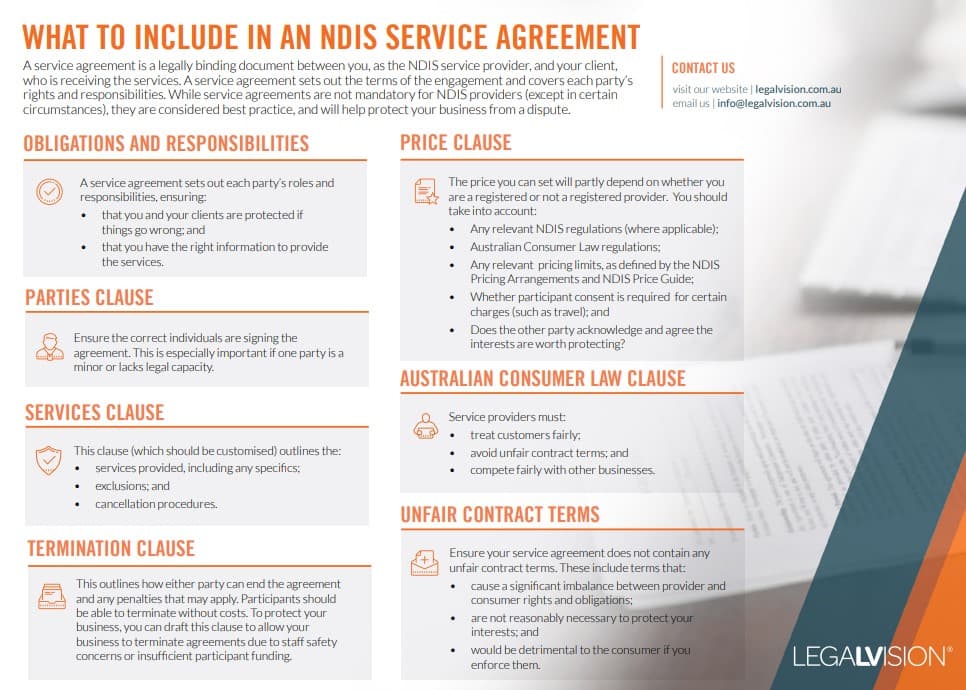As a National Disability Insurance Scheme (NDIS) provider, your business will have many different responsibilities. These include your legal duties as an employer towards your staff, as well as protecting your business. This article will outline key issues to consider when you begin employing individuals as a registered NDIS provider.
What Type of Employee Should I Hire?
One of the first things you need to consider is what type of employee you will engage. This will largely depend on the requirements of your business. For example, do you need flexibility when it comes to offering employees work? There are various types of employees and each type has different entitlements. The two main types of employees are casual and permanent employees.
Casual Employment
Casual employment involves a flexible arrangement where you do not guarantee the employee ongoing work with your business. Instead, you can offer casual employees shifts as your business needs them. However, casual employees are able to simply accept or refuse these shifts.
Unlike permanent employees, you do not owe casual employees entitlements such as paid personal or annual leave. Instead, the law entitles casual employees to a 25% loading on top of their hourly base rate.
Hiring a casual employee may be suited to your business if you are not able to provide employees with a commitment to ongoing work. This is an ideal form of employment if you are still building up your client base.
Permanent Employment
A permanent employee will work set hours each week and have an ongoing working relationship with your business. They can either be full-time or part-time. A full-time employee usually works 38 hours per week, whereas part-time employees will work less than 38 hours.
It is important to remember that you owe permanent employees specific entitlements, such as:
- paid annual leave;
- personal leave; and
- a more extended notice of termination.
Before you engage a permanent employee, you should carefully consider whether your business is in a position to guarantee ongoing work. This type of employee may be better suited to your business if you require staff to be available for set shifts.
How Much Should I Be Paying My Employees?
One of the main questions you will have as an employer is how much your employees should be paid. Determining the minimum amount of payment for different staff members can be a complex task.
Every employee in Australia is entitled to minimum wage. The National Minimum Wage is currently $23.23 per hour or $882.80 per week for full-time work. However, employees may also be covered by a modern award or enterprise agreement, which will outline certain minimum entitlements.
An award or enterprise agreement will also provide information on an employee’s other entitlements, such as:
- overtime;
- penalty rates; and
- allowances.
These entitlements will depend on their hours or conditions of work.

This fact sheet will help you to identify the key terms you must include in your NDIS service agreement.
Do I Need Employment Contracts?
Employment contracts are essential to protect your business interests and meet your obligations as an employee.
An employment contract should clarify the type of employee you are engaging and include terms and conditions for:
- pay rates;
- notice of termination;
- confidentiality;
- intellectual property; and
- restraints.
You can also include terms about any personalised support that the employee may need.
Do I Need Workplace Policies as an NDIS Provider?
As a registered provider, it is vital that you have workplace policies in place that set out the expectations of your employees. This helps you protect your business and support NDIS participants.
For example, as an employer, you must ensure the health and safety of a number of individuals, including:
- your employees;
- contractors; and
- NDIS participants.
A robust work health and safety policy can assist you in meeting this duty. This should outline what is expected of such individuals and the procedures you will follow to ensure their health and safety remain paramount. Other policies you may consider implementing are a:
- information technology policy;
- bullying and harassment policy; or
- client management policy.
Key Takeaways
Before you consider engaging employees as an NDIS provider, there are a number of points you should consider. These include the type of employee you want to engage and the relevant documentation you should have in place before their commencement.
If you need help understanding your obligations as an employer, our experienced employment lawyers can assist as part of our LegalVision membership. For a low monthly fee, you will have unlimited access to lawyers to answer your questions and draft and review your documents. Call us today on 1300 544 755 or visit our membership page.
We appreciate your feedback – your submission has been successfully received.











